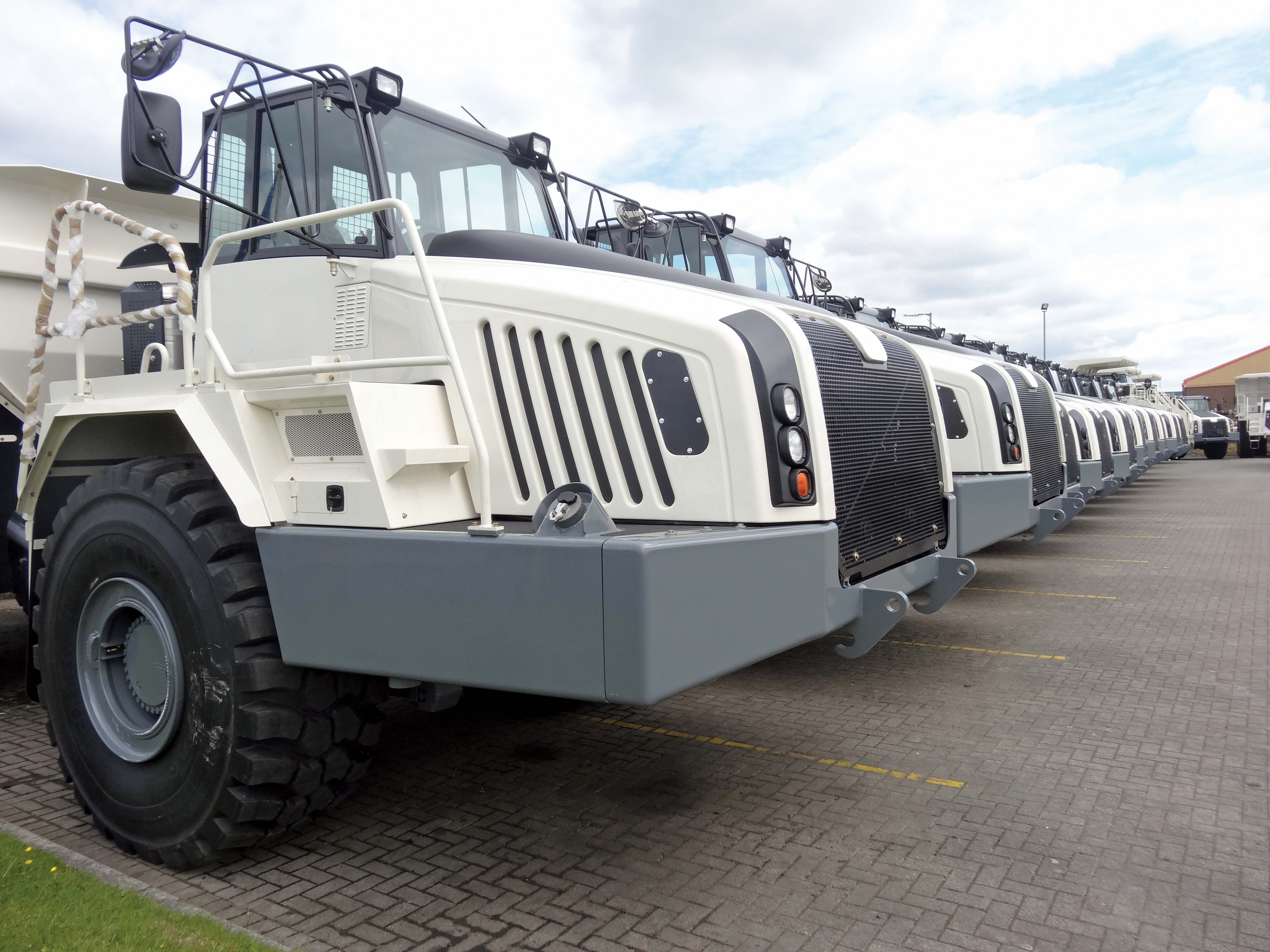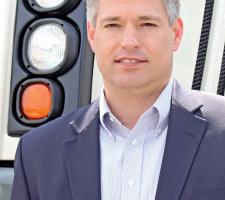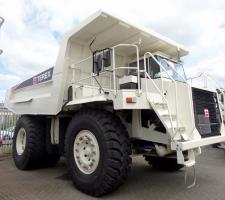
The June 2014 completion of the US$160 million acquisition of Terex Trucks by Volvo Construction Equipment was one of last year’s biggest deals in the global construction equipment market. While the acquired company’s rigid dump trucks now fill what was a notable gap in Volvo CE’s product range, there was always going to be some short-term pain for Terex Trucks before the long-term benefits of investment from one of the world’s leading construction equipment names take effect. Guy Woodford reports
“We shipped the first nineteen units to the customer over the summer and have another ten scheduled for delivery in October.”
While Douglas is understandably delighted with all new orders and is very confident that
“I think the future of Terex Trucks is much more secure under Volvo ownership. I’m never going to criticise our previous owners, Terex Corporation. They had their own strategy and their own tactics, which they deployed well. But what I’ve learned from the year under Volvo is that they definitely have much more future vision and long-term planning with regard to light mining and heavy construction, when it comes to the products, people and processes that they deploy. We spend a lot of time thinking about the medium to long-term strategy and the moves we have to make today to deliver on it.”
Douglas says that due to the worldwide commodity mining market continuing to be “quite depressed”, Terex Trucks has needed to make some unpleasant short-term decisions.
“We’ve seen a particularly low level of order intake from this market. Probably around 70% of our business is connected to commodity mining of one type or another.
“Articulated haulers can be used in heavy construction work and infrastructure, as well as light mining applications. Rigid trucks are for quarry, aggregate production and open cast coal work and other types of commodity mining. We probably haven’t done enough until now to get more into the heavier construction and infrastructure market.”
Due to low orders and volumes of trucks going through the factory, Douglas says that Terex Trucks had to unfortunately embark on a redundancy programme as part of the company’s short-term business plan. “Those affected were from areas touched on by the low production volumes. Areas like R&D, customer support, service, spares and aftermarket have not been touched, and our apprentice programme has not been affected.
“We’re preserving investments for the medium to longer term, but we have to take unpleasant short-term decisions.
We are confident the markets will come back. Population growth globally will continue and drive the need for housing, energy, communications and infrastructure. For that you need base commodities – minerals and metals.”
Douglas says that Terex Trucks has been keen to reassure its end customers and dealer network since the Volvo CE acquisition – setting up new regional dealer support programmes. “The dealers were unsure what their futures would be. They saw a new owner with similar products already in its portfolio, and which has a very healthy global distribution. But we and Volvo have stated from the very beginning that we are dedicated to working with existing dealers that have remained committed to our products and working with us.”
Douglas adds that where the opportunity has arisen, Terex Trucks has engaged with Volvo CE dealers. “Being part of the Volvo dealer network, it does give us access to strong, well-capitalised Volvo distribution. It has opened up new territories for us.”
A major Terex Trucks dealer conference staged at Motherwell HQ in late 2014 and the company’s impressive independent stand presence at INTERMAT 2015 has helped, says Douglas, Terex Trucks to deliver a strong message about its healthy long-term future. “It’s enabled us to say that we are still here. We are still Terex Trucks. We do have a very strong, professional owner, and we will be successful.”
Part of the key to Terex Trucks long-term success will be in its development of new RDT and ADT models. The company has started a major new rigid truck development programme, with the first models due to go onto the market in the coming years. “The reason it will take time to bring new rigid haulers to the market is because it’s a completely new truck,” explains Douglas. “We have a range of truck sizes to develop, under a common architecture and concept.
“Of the articulated haulers. Volvo has very good articulated hauler products, as do we. We are going through an exercise of determining exactly what the product position should be for Terex Trucks articulated haulers and the appropriate investment required for the product platform. In fact we have a number of exciting things lined up for bauma 2016 in Munich, Germany.”
Douglas is keen to stress that during Volvo CE’s negotiations to acquire Terex Trucks, Volvo CE and Terex Corporation agreed that Terex Trucks would stick to its capital investment plans. This has ensured the completion of the installation of new machine shop capacity at the Motherwell factory, and a new heat treatment facility for some of the key components of the rigid and articulated trucks. Douglas says that when market demand improves and staff are rehired, the capital investment in the factory means that Terex Trucks could easily produce up to 1,000 trucks per year. However, the current production focus is on environment, safety, quality and efficiency improvements.
“Our team can see that investments are being planned and executed, and are continuing. They know there is development work being done on new products. Whilst orders are low, the team has some confidence that we expect to see production levels grow,” says Douglas.
In anticipation of an upturn in both ADT and RDT demand, and in order to better handle existing customer orders, the Volvo CE acquisition has allowed Terex Trucks to increase its aftermarket staff numbers over the past 15 months. This has included increased inventory levels and what Douglas describes as “very healthy” fill rates. Since January this year, the development of Terex Trucks enhanced aftermarket capability has been led by the firm’s sales and marketing director Sam Wyant, formerly of Volvo CE.
Of markets that are going to drive Terex Trucks short-term sales growth, Douglas says: “The general global market conditions are flat at best. Current economic slowdown in China will have a further ripple effect globally, and especially in Asia-Pacific and Africa. We’re a long way from getting back to recent historic market peaks post-global recession (2011), and the recovery will be flat for a period, then slow and steady.
“The strongest market for now is North America - no question. We would normally see 40-50% of our sales there, but it’s likely to be 65-70% this year. We are also seeing growth in some areas where we have historically had healthy sales, Indonesia for example, but still from a very low level.
“We also appointed at INTERMAT 2015 the Volvo north, central and western Africa dealer SMT to cover areas that were mostly white space for us. Those guys will be great news for us.”
Since my conversation with Douglas earlier in the summer, Terex Trucks says a number of other new dealers have been appointed, with a “huge new dealer” due to be unveiled soon.
There has been much short-term pain – but it seems long-term gain may be closer than anticipated for Terex Trucks.

















